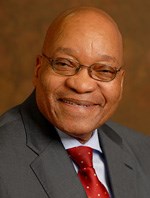The right to be heard
Last month the Judicial Service Commission interviewed four candidates to fill the Constitutional Court vacancy left by the retirement of Judge Sandile Ngcobo.

(Image: GCIS)
It has been said that the appointment of judges is the most important exercise of power in a democracy. They interpret the law and dispense justice. The right of every individual to be "judged" impartially and to receive justice without interference or favour is the cornerstone of the rule of law in a constitutional democracy.
There can, therefore, be no more important appointment than that of a judge of the Constitutional Court.
All four candidates were found to be potentially suitable for the position and their names were forwarded to President Jacob Zuma for consideration.
According to Section 174 of the Constitution, the president can appoint any of the candidates on the short list, but only after consulting the leaders of opposition parties and the chief justice.
In several recent examples, this consultation has taken the form of a letter from the president asking for our views only on his preferred candidate, and sometimes only a few days before the official announcement.
Zuma's interpretation of the requirement for "consultation" has, in our view, been inadequate in the past and has undermined the legitimacy of the judicial appointment process.
Consultation means consultation
Last year, the process of appointing a new chief justice became embroiled in controversy when citizens, the legal fraternity and political parties across the board objected to the way in which the appointment process was handled.
The president simply has not been interested in meaningful consultation in the past. He sought "consultation" at the last moment as a mere formality.
He did not reply to feedback received, and all indications have been that he would not consider changing his preferred candidates after the consultation process.
This renders the requirement for consultation pointless since the purpose of consultation is always to obtain a multiplicity of views to assist in making the right decision.
The interim constitution clearly defined what "consultation" entails. Section 233 (4) read: "Where in this constitution any functionary is required to take a decision after consultation with another functionary, such decision shall be taken in good faith after consulting and giving serious consideration to the views of such other functionary."
The drafters of the final constitution were guided by this definition. Consulting without taking seriously the advice given by those consulted is nothing but an empty and worthless gesture.

(Image: GCIS)
The injunction to consult is designed to protect all South Africans from political influence in the highest court in the land.
A superficial acknowledgement of consultation damages the legitimacy of the appointment process, and undermines the credibility of the appointee.
Consultations need to be meaningful, and be given due consideration
I have communicated my views on this vital matter to the president, and have made a number of suggestions that would ensure that substantive and meaningful consultations can take place in future.
First, the president should seek consultation and input on the full candidate short list and not just the name of his preferred candidate.
Second, opposition parties should be given sufficient time to prepare written submissions on the suitability of candidates.
I have suggested that a period of 14 days would serve as a fair timeframe to compile these submissions thoroughly.
Third, upon receiving the submissions, the president should apply his mind to the points raised, be prepared to motivate his preferred candidate, and be open to changing his view.
Formal written responses to points raised by the other parties should be prepared by the Presidency, and if necessary, the president should be willing to meet leaders of the opposition parties to discuss his choice.
To ensure that the constitutional requirement for consultation is credible and authentic, Zuma must show a willingness to assimilate other views through "serious consideration", defend his choice and even change his mind.
From today, he can demonstrate his serious intent to do so by accepting the DA's proposals.
Source: The Times via I-Net Bridge
About the author
Helen Zille is leader of the Democratic Alliance.